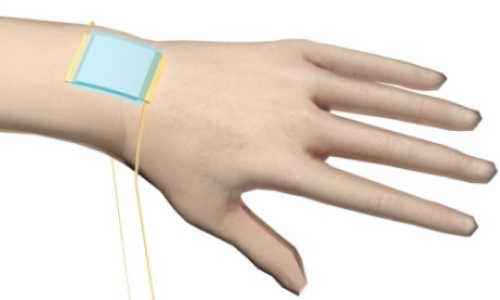Touch can be a subtle sense, but it communicates quickly whether something in our hands is slipping, for example, so we can tighten our grip. For the first time, scientists report the development of a stretchable “electronic skin” closely modeled after our own that can detect not just pressure, but also what direction it’s coming from.
A new kind of stretchy “electronic skin” (blue patch) is the first to be able to detect directional pressure.
Credit: American Chemical Society
The study on the advance, which could have applications for prosthetics and robotics, appears in the journal ACS Nano.
Hyunhyub Ko and colleagues explain that electronic skins are flexible, film-like devices designed to detect pressure, read brain activity, monitor heart rate or perform other functions. To boost sensitivity to touch, some of them mimic microstructures found in beetles and dragonflies, for example, but none reported so far can sense the direction of stress. This is the kind of information that can tell our bodies a lot about the shape and texture of an object and how to hold it. Ko’s team decided to work on an electronic skin based on the structure of our own so it could “feel” in three dimensions.
The researchers designed a wearable artificial skin made out of tiny domes that interlock and deform when poked or even when air is blown across it. It could sense the location, intensity and direction of pokes, air flows and vibrations. The scientists conclude that their advance could potentially be used for prosthetic limbs, robotic skins and rehabilitation devices.
Story Source:
The above story is based on materials provided by ACS.





